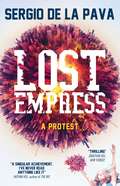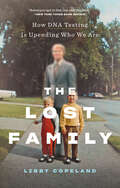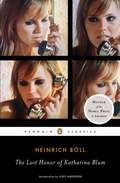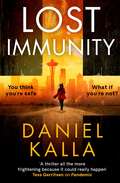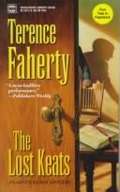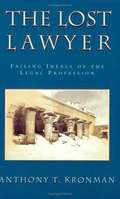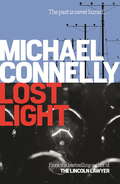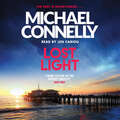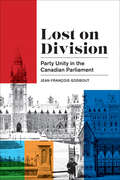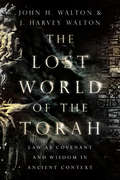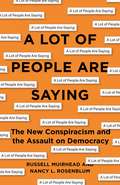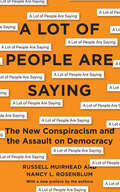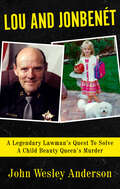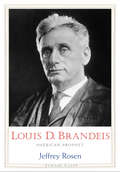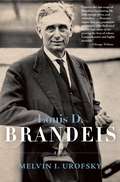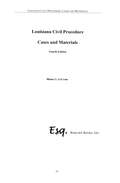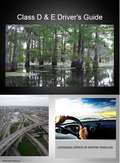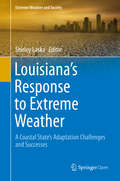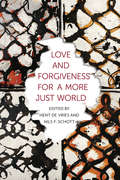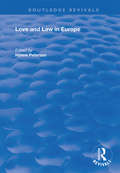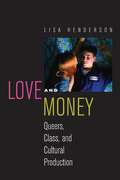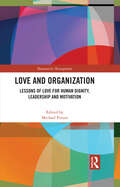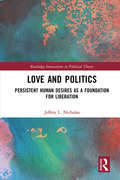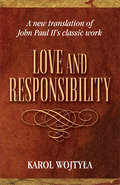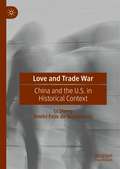- Table View
- List View
Lost Empress
by Sergio De La Pava"Ambitious, affecting, intelligent, plangent, comic, kooky and impassioned. I've read a lot of novels this year, between judging the Man Booker prize and the Granta Best of Young British Novelists, and I've yearned for this kind of exuberant, precise fiction" Stuart Kelly, Guardian on A Naked SingularityIt would take something huge to put Paterson, New Jersey on the map.But Nina Gill is determined to do just that. She is the daughter of the ageing owner of the Dallas Cowboys and the well-kept secret to their success. Shocked when her brother inherits the team, leaving her with the Paterson Pork, New Jersey's only Indoor Football League franchise, she vows to take on the N.F.L. and make her new team the pigskin kings of America.Meanwhile, Nuno DeAngeles - a brilliant criminal mastermind - contrives to be thrown into Rikers Island prison to commit one of the most audacious crimes of all time. Now he's on the inside, he has two good reasons to get out. But how does a person of culture go about breaking out of the penal system when the whole of the land of the free is addicted to keeping him in it?Without knowing it, or ever having met, Nina and Nuno have already had a profound effect on each other's lives. As his bid for freedom and her bid for sporting immortality reach crisis point, their stories converge in the countdown to an epic conclusion. Thrilling, touching, insightful and shockingly hilarious, De La Pava's extraordinary novel gets under the skin and into the minds of a vast cast of characters from the fringes of society - immigrants, exiles and outsiders.
The Lost Family: How DNA Testing Is Upending Who We Are
by Libby Copeland“A fascinating exploration of the mysteries ignited by DNA genealogy testing—from the intensely personal and concrete to the existential and unsolvable.” —Tana French, New York Times–bestselling author You swab your cheek or spit in a vial, then send it away to a lab somewhere. Weeks later you get a report that might tell you where your ancestors came from or if you carry certain genetic risks. Or, the report could reveal a long-buried family secret that upends your entire sense of identity. Soon a lark becomes an obsession, a relentless drive to find answers to questions at the core of your being, like “Who am I?” and “Where did I come from?” Welcome to the age of home genetic testing.In The Lost Family, journalist Libby Copeland investigates what happens when we embark on a vast social experiment with little understanding of the ramifications. She explores the culture of genealogy buffs, the science of DNA, and the business of companies like Ancestry and 23andMe, all while tracing the story of one woman, her unusual results, and a relentless methodical drive for answers that becomes a thoroughly modern genetic detective story. Gripping and masterfully told, The Lost Family is a spectacular book on a big, timely subject.“An urgently necessary, powerful book that addresses one of the most complex social and bioethical issues of our time.” —Dani Shapiro, New York Times–bestselling author“Before you spit in that vial, read this book.” —The New York Times Book Review“Impeccably researched . . . up-to-the-minute science meets the philosophy of identity in a poignant, engaging debut.” —Kirkus Reviews (starred review)
The Lost Honor of Katharina Blum: Or, How Violence Develops and Where It Can Lead
by Heinrich Böll Leila Vennewitz Kurt AndersenNobel Prize winner Heinrich Böll?s powerful novel about a woman terrorized by the media In an era in which journalists will stop at nothing to break a story, Henrich Böll?s The Lost Honor of Katharina Blum has taken on heightened relevance. A young woman?s association with a hunted man makes her the target of a journalist determined to grab headlines by portraying her as an evil woman. As the attacks on her escalate and she becomes the victim of anonymous threats, Katharina sees only one way out of her nightmare. Turning the mystery genre on its head, the novel begins with the confession of a crime, drawing the reader into a web of sensationalism, character assassination, and the unavoidable eruption of violence.
Lost Immunity: A thrilling novel that will keep you reading into the night
by Daniel KallaAn ordinary day Seattle is stunned when a deadly bacteria tears through a nearby Bible camp. Early tests reveal it is a form of meningitis, and the camp&’s residents are among its most vulnerable victims: children and teenagers.A new vaccine Seattle&’s chief public health officer, Lisa Dyer, and her team quickly take steps to contain the outbreak. When testing reveals the strain is one that caused catastrophic losses in Iceland just months earlier, she contacts a pharmaceutical company doing final-phase trials on a viable vaccine and asks them to release it early.An epidemic in the making Despite protests, vaccine clinics roll out across the city, and the risky strategy appears to be working. Until people start dying from mysterious and horrific causes . . .Praise for Daniel Kalla &‘A thrilling, front-line drama&’ Kathy Reichs &‘Kalla strikes again with another perfect page-turner&’ Lee Child &‘A superbly written suspense novel . . . masterful&’ Steven Hartov &‘Fast, fierce and frightening. Kalla delivers a shot of adrenaline in a medical thriller that really thrills&’ Don Winslow &‘This important, must-read book is not only well-researched and entirely realistic, it gives a human face to a devastating epidemic&’ Robyn Harding &‘Fast-paced and smartly written . . . a force to be reckoned with&’ Booklist
The Lost Keats ( An Owen Keane Mystery #3)
by Terence Faherty[from the back cover] "FROM KEATS TO A KILLER... A man with more questions than answers, Owen Keane has one foot in the priesthood, the other in detective novels--a trait that finds him questioning his own vocation. So when a fellow seminarian disappears, Owen sees it as a chance to unravel a mystery, and perhaps his own inner struggles. But it's not until he meets a descendant of the English poet John Keats that scattered clues fall into place. At the center is a missing sonnet, but from there things turn modern--with marijuana and murder adding to the mystery that becomes deadly as Owen gets closer to the truth... and to a killer with a message just for him." Check the Bookshare collection for more books in the Owen Keane series about a young man whose love of reading mysteries leads him to investigate crime as he moves toward his future uncertain whether he is suited to become a priest. Look for #1. Deadstick, #2. Live to Regret, #3. The Lost Keats, #4. Die Dreaming, #5. Prove the Nameless, #6. The Ordained, #7. Orion Rising and #8. Eastward in Eden.
The Lost Lawyer: Failing Ideals of the Legal Profession
by Anthony T. KronmanAnthony Kronman describes a spiritual crisis affecting the American legal profession, and attributes it to the collapse of what he calls the ideal of the lawyer-statesman: a set of values that prizes good judgment above technical competence and encourages a public-spirited devotion to the law. <p><p> For nearly two centuries, Kronman argues, the aspirations of American lawyers were shaped by their allegiance to a distinctive ideal of professional excellence. In the last generation, however, this ideal has failed, undermining the identity of lawyers as a group and making it unclear to those in the profession what it means for them personally to have chosen a life in the law. <p> A variety of factors have contributed to the declining prestige of prudence and public-spiritedness within the legal profession. Partly, Kronman asserts, it is the result of the triumph, in legal thought, of a counterideal that denigrates the importance of wisdom and character as professional virtues. Partly, it is due to an array of institutional forces, including the explosive growth of the country's leading law firms and the bureaucratization of our courts. The Lost Lawyer examines each of these developments and illuminates their common tendency to compromise the values from which the ideal of the lawyer-statesman draws strength. It is the most important critique of the American legal profession in some time, and an an enduring restatement of its ideals.
Lost Light (Harry Bosch Series #9)
by Michael ConnellyAward-winning No.1 bestselling author Michael Connelly's ninth Bosch book. Hieronymus (Harry) Bosch has retired from the Los Angeles Police Department - but the discovery of a startling unsolved murder among his old case files means he cannot rest until he finds the killer. When he left the LAPD, Bosch took a file with him: the case of a production assistant murdered four years earlier during a movie set robbery. The LAPD thinks the stolen money was used to finance a terrorist training camp. Thoughts of the original murder victim were lost in the federal zeal, and when Bosch decides to reinvestigate, he quickly falls foul of both his old colleagues and the FBI. When the private investigation enables him to meet up with an old friend, shadows from his past come back to haunt him . . .
Lost Light (Harry Bosch Series #9)
by Michael ConnellyAward-winning No.1 bestselling author Michael Connelly's ninth Bosch book. Hieronymus (Harry) Bosch has retired from the Los Angeles Police Department - but the discovery of a startling unsolved murder among his old case files means he cannot rest until he finds the killer. When he left the LAPD, Bosch took a file with him: the case of a production assistant murdered four years earlier during a movie set robbery. The LAPD thinks the stolen money was used to finance a terrorist training camp. Thoughts of the original murder victim were lost in the federal zeal, and when Bosch decides to reinvestigate, he quickly falls foul of both his old colleagues and the FBI. When the private investigation enables him to meet up with an old friend, shadows from his past come back to haunt him . . .
Lost on Division: Party Unity in the Canadian Parliament (Political Development: Comparative Perspectives)
by Jean-François GodboutCompared to other countries, Canada’s Parliament shows a high level of party unity when it comes to legislative voting. This was not always the case, however. One hundred years ago, this sort of party discipline was not as evident, leading scholars to wonder what explains the growing influence of political parties in the Canadian Parliament. In Lost on Division, Jean-François Godbout analyses more than two million individual votes recorded in the House of Commons and the Senate since Confederation, demonstrating that the increase in partisanship is linked to changes in the content of the legislative agenda, itself a product of more restrictive parliamentary rules instituted after 1900. These rules reduced the independence of private members, polarized voting along partisan lines, and undermined Parliament’s ability to represent distinct regional interests, resulting in – among other things – the rise of third parties. Bridging the scholarship on party politics, legislatures, and elections, Lost on Division builds a powerful case for bringing institutions back into our understanding of how party systems change. It represents a significant contribution to legislative studies, the political development literature, and the comparative study of parliaments.
The Lost World of the Torah: Law as Covenant and Wisdom in Ancient Context (The Lost World Series #Volume 6)
by John H. Walton J. Harvey WaltonOur handling of what we call biblical law veers between controversy and neglect. On the one hand, controversy arises when Old Testament laws seem either odd beyond comprehension (not eating lobster) or positively reprehensible (executing children). On the other, neglect results when we consider the law obsolete, no longer carrying any normative power (tassels on clothing, making sacrifices). Even readers who do attempt to make use of the Old Testament "law" often find it either irrelevant, hopelessly laden with "thou shalt nots," or simply so confusing that they throw up their hands in despair. Despite these extremes, people continue to propose moral principles from these laws as "the biblical view" and to garner proof texts to resolve issues that arise in society. The result is that both Christians and skeptics regularly abuse the Torah, and its true message often lies unheard. Walton and Walton offer in The Lost World of the Torah a restorative vision of the ancient genre of instruction for wisdom that makes up a significant portion of the Old Testament. In the ancient Near East, order was achieved through the wisdom of those who governed society. The objective of torah was to teach the Israelites to be wise about the kind of order needed to receive the blessings of God’s favor and presence within the context of the covenant. Here readers will find fresh insight on this fundamental genre of the Old Testament canon.
A Lot of People Are Saying: The New Conspiracism and the Assault on Democracy
by Nancy L. Rosenblum Russell MuirheadHow the new conspiracists are undermining democracy—and what can be done about itConspiracy theories are as old as politics. But conspiracists today have introduced something new—conspiracy without theory. And the new conspiracism has moved from the fringes to the heart of government with the election of Donald Trump. In A Lot of People Are Saying, Russell Muirhead and Nancy Rosenblum show how the new conspiracism differs from classic conspiracy theory, why so few officials speak truth to conspiracy, and what needs to be done to resist it.Classic conspiracy theory insists that things are not what they seem and gathers evidence—especially facts ominously withheld by official sources—to tease out secret machinations. The new conspiracism is different. There is no demand for evidence, no dots revealed to form a pattern, no close examination of shadowy plotters. Dispensing with the burden of explanation, the new conspiracism imposes its own reality through repetition (exemplified by the Trump catchphrase “a lot of people are saying”) and bare assertion (“rigged!”).The new conspiracism targets democratic foundations—political parties and knowledge-producing institutions. It makes it more difficult to argue, persuade, negotiate, compromise, and even to disagree. Ultimately, it delegitimates democracy.Filled with vivid examples, A Lot of People Are Saying diagnoses a defining and disorienting feature of today’s politics and offers a guide to responding to the threat.
A Lot of People Are Saying: The New Conspiracism and the Assault on Democracy
by Nancy L. Rosenblum Russell MuirheadHow the new conspiracists are undermining democracy—and what can be done about itConspiracy theories are as old as politics. But conspiracists today have introduced something new—conspiracy without theory. And the new conspiracism has moved from the fringes to the heart of government with the election of Donald Trump. In A Lot of People Are Saying, Russell Muirhead and Nancy Rosenblum show how the new conspiracism differs from classic conspiracy theory, how it undermines democracy, and what needs to be done to resist it.
Lou and Jonbenet: A Legendary Lawman's Quest to Solve a Child Beauty Queen's Murder
by John Wesley AndersonOn Christmas Night 1996, six-year-old JonBenet Ramsey was murdered in her family’s home in Boulder, Colorado. A ransom note was found in the home, but it was hours before her father, John, found her body in the basement. She had been strangled with a garrote and her skull was fractured. The media sensationalized the tragic death of the “child beauty queen” and public speculation and rumors ran rampant. What followed was one of the most notorious unsolved murder investigations in American history. Boulder police fixated on JonBenet’s parents as suspects. Needing investigative help, the Boulder DA brought in legendary homicide detective Lou Smit. However, he was soon disenchanted with law enforcement’s obsession with the Ramsey family as the primary suspects, excluding other possibilities. Smit resigned but continued to work on his own time, and at his own expense, determined to find justice for JonBenet. He determined the Ramsey family was not involved in her death but died in 2010 before he could identify the killer. Thousands of people attended his funeral service, including John Ramsey, and the detective’s lifelong friend and colleague, John Anderson. Along with a handful of retired detectives, Anderson and Smit’s family continue to pursue justice based on Smit’s work. Now, for the first time in LOU AND JONBENET, Anderson tells the story of Smit’s investigation and why the Smit family team now believes that the killer can be identified.
Louis D. Brandeis: American Prophet
by Jeffrey RosenAccording to Jeffrey Rosen, Louis D. Brandeis was "the Jewish Jefferson," the greatest critic of what he called "the curse of bigness," in business and government, since the author of the Declaration of Independence. Published to commemorate the hundredth anniversary of his Supreme Court confirmation on June 1, 1916, Louis D. Brandeis: American Prophet argues that Brandeis was the most farseeing constitutional philosopher of the twentieth century. In addition to writing the most famous article on the right to privacy, he also wrote the most important Supreme Court opinions about free speech, freedom from government surveillance, and freedom of thought and opinion. And as the leader of the American Zionist movement, he convinced Woodrow Wilson and the British government to recognize a Jewish homeland in Palestine. Combining narrative biography with a passionate argument for why Brandeis matters today, Rosen explores what Brandeis, the Jeffersonian prophet, can teach us about historic and contemporary questions involving the Constitution, monopoly, corporate and federal power, technology, privacy, free speech, and Zionism.
Louis D. Brandeis: A Life
by Melvin UrofskyThe first full-scale biography in twenty-five years of one of the most important and distinguished justices to sit on the Supreme Court-a book that reveals Louis D. Brandeis the reformer, lawyer, and jurist, and Brandeis the man, in all of his complexity, passion, and wit.A huge and galvanizing biography, a revelation of one man's effect on American society and jurisprudence, and the electrifying story of his time.ngs bank life insurance in Massachusetts (he considered it his most important contribution to the public weal) and was a driving force in the development of the Federal Reserve Act, the Clayton Antitrust Act, and the law establishing the Federal Trade Commission.Brandeis as an economist and moralist warned in 1914 that banking and stock brokering must be separate, and twenty years later, during the New Deal, his recommendation was finally enacted into law (the Glass-Steagall Act of 1933) but was undone by Ronald Reagan, which led to the savings-and-loan crisis in the 1980s and the world financial collapse of 2008.We see Brandeis, who came from a family of reformers and intellectuals who fled Europe and settled in Louisville. Brandeis the young man coming of age, who presented himself at Harvard Law School and convinced the school to admit him even though he was underage. Brandeis the lawyer and reformer, who in 1908 agreed to defend an Oregon law establishing maximum hours for women workers, and in so doing created an entirely new form of appellate brief that had only a few pages of legal citation and consisted mostly of factual references.Urofsky writes how Brandeis witnessed and suffered from the anti-Semitism rampant in the early twentieth century and, though not an observant Jew, with the outbreak of the Great War in 1914, became at age fifty-eight head of the American Zionist movement. During the next seven years, Brandeis transformed it from a marginal activity into a powerful force in American Jewish affairs. We see the brutal six-month confirmation battle after Wilson named the fifty-nine-year-old Brandeis to the court in 1916; the bitter fight between progressives and conservative leaders of the bar, finance, and manufacturing, who, while never directly attacking him as a Jew, described Brandeis as "a striver," "self-advertiser," "a disturbing element in any gentleman's club." Even the president of Harvard, A. Lawrence Lowell, signed a petition accusing Brandeis of lacking "judicial temperament." And we see, finally, how, during his twenty-three years on the court, this giant of a man and an intellect developed the modern jurisprudence of free speech, the doctrine of a constitutionally protected right to privacy, and suggested what became known as the doctrine of incorporation, by which the Bill of Rights came to apply to the states. Brandeis took his seat when the old classical jurisprudence still held sway, and he tried to teach both his colleagues and the public- especially the law schools-that the law had to change to keep up with the economy and society. Brandeis often said, "My faith in time is great." Eventually the Supreme Court adopted every one of his dissents as the correct constitutional interpretation. A huge and galvanizing biography, a revelation of one man's effect on American society and jurisprudence, and the electrifying story of his time.From the Hardcover edition.
Louisiana Civil Procedure: Cases and Materials
by Blaine G. LeCesneLouisiana Civil Procedure: Cases and Materials (Fourth Edition)
Louisiana Class D and E Driver's Guide
by Louisiana Office of Motor Vehicles<p>This guide is designed to provide you with the rules of the road, knowledge to assist you in making better driving decisions and valuable information on safety and sharing the road with others. It is incumbent upon you, the driver, to respect all traffic laws and other drivers as well. <p>This guide is not intended to be an official legal reference to the Louisiana traffic laws. It only highlights those laws, driving practices and procedures that you will use most often. It should be noted that the material in this guide is subject to change to comply with amended State and Federal legislations.</p>
Louisiana's Response to Extreme Weather: A Coastal State's Adaptation Challenges and Successes (Extreme Weather and Society)
by Shirley LaskaThis book is open access under a CC BY 4.0 license.This book takes an in-depth look at Louisiana as a state which is ahead of the curve in terms of extreme weather events, both in frequency and magnitude, and in its responses to these challenges including recovery and enhancement of resiliency.Louisiana faced a major tropical catastrophe in the 21st century, and experiences the fastest rising sea level. Weather specialists, including those concentrating on sea level rise acknowledge that what the state of Louisiana experiences is likely to happen to many more, and not necessarily restricted to coastal states. This book asks and attempts to answer what Louisiana public officials, scientists/engineers, and those from outside of the state who have been called in to help, have done to achieve resilient recovery. How well have these efforts fared to achieve their goals? What might these efforts offer as lessons for those states that will be likely to experience enhanced extreme weather? Can the challenges of inequality be truly addressed in recovery and resilience? How can the study of the Louisiana response as a case be blended with findings from later disasters such as New York/New Jersey (Hurricane Sandy) and more recent ones to improve understanding as well as best adaptation applications – federal, state and local?
Love and Forgiveness for a More Just World (Religion, Culture, and Public Life #24)
by Hent De Vries Nils SchottOne can love and not forgive or out of love decide not to forgive. Or one can forgive but not love, or choose to forgive but not love the ones forgiven. Love and forgiveness follow parallel and largely independent paths, a truth we fail to acknowledge when we pressure others to both love and forgive. Individuals in conflict, sparring social and ethnic groups, warring religious communities, and insecure nations often do not need to pursue love and forgiveness to achieve peace of mind and heart. They need to remain attentive to the needs of others, an alertness that prompts either love or forgiveness to respond. By reorienting our perception of these enduring phenomena, the contributors to this volume inspire new applications for love and forgiveness in an increasingly globalized and no longer quite secular world. With contributions by the renowned French philosophers Jacques Derrida and Jean-Luc Marion, the poet Haleh Liza Gafori, and scholars of religion (Leora Batnitzky, Nils F. Schott, Hent de Vries), psychoanalysis (Albert Mason, Orna Ophir), Islamic and political philosophy (Sari Nusseibeh), and the Bible and literature (Regina Schwartz), this anthology reconstructs the historical and conceptual lineage of love and forgiveness and their fraught relationship over time. By examining how we have used—and misused—these concepts, the authors advance a better understanding of their ability to unite different individuals and emerging groups around a shared engagement for freedom and equality, peace and solidarity.
Love and Law in Europe (Routledge Revivals)
by Hanne PetersenFirst published in 1998, this volume aims to draw attention to an ongoing shift in the perception of law, which is now increasingly understood as a cultural and historical phenomenon. As other such phenomena – like music, literature, or art – it is acknowledged that it is created in a specific environment, on which it is dependent for its functioning and interpretation. The historical aspects of love in a European and Nordic context are underlined, as well as the modern understanding of love and law as incompatible and contrasting concepts. Developments within the European Union and especially the relation of the EU to so called third country nationals and immigrants demonstrate that the problematic concerning law and love is not only one of legal philosophy but also of legal and everyday reality. The claim that love has been specifically ‘European’ is discarded as Eurocentrist, and the need for more particular emotions and a more pragmatic approach to romantic feelings, for a ‘reasonable love’ is discussed from legal, feminist and philosophical perspectives.
Love and Money: Queers, Class, and Cultural Production (Critical Cultural Communication #18)
by Lisa HendersonLove and Money argues that we can't understand contemporary queer cultures without looking through the lens of social class. Resisting old divisions between culture and economy, identity and privilege, left and queer, recognition and redistribution, Love and Money offers supple approaches to capturing class experience and class form in and around queerness. Contrary to familiar dismissals, not every queer television or movie character is like Will Truman on Will and Grace--rich, white, healthy, professional, detached from politics, community, and sex. Through ethnographic encounters with readers and cultural producers and such texts as Boys Don't Cry, Brokeback Mountain, By Hook or By Crook, and wedding announcements in the New York Times, Love and Money sees both queerness and class across a range of idioms and practices in everyday life. How, it asks, do readers of Dorothy Allison's novels use her work to find a queer class voice? How do gender and race broker queer class fantasy? How do independent filmmakers cross back and forth between industry and queer sectors, changing both places as they go and challenging queer ideas about bad commerce and bad taste? With an eye to the nuances and harms of class difference in queerness and a wish to use culture to forge queer and class affinities, Love and Money returns class and its politics to the study of queer life.
Love and Organization: Lessons of Love for Human Dignity, Leadership and Motivation (Humanistic Management)
by Michael PirsonOrganizations are not human, but they are made up of people. Examining the organization, functioning, growing and developing and moving together as one unit, the well-being and success of that organization depends on the well-being of people that make it up. Love, in its various forms, is the energy that motivates and fuels creativity, care, innovation, progress and well-being. Traditionally, organizational structures have been set up to support compliance and command and control, which often discourages love and creates policies against love at the workplace. The result has been reduced growth, productivity and retention of businesses as well as reduced well-being for employees. This reduced connectivity between individuals has also, at a higher level, adversely affected society. Without love, people are working and performing with reduced energy, and at reduced capacity. While prior research has been focused on love at the workplace from the viewpoint of psychologists, this book explores the impact of love within organizational contexts from various viewpoints including management, psychology, and philosophy. It explores love in the organizational context by looking at how it affects meaning, purpose, well-being, motivation, faith, care, spiritual development and how the identity and well-being of each person in the organization positively affects retention and the growth and success of that organization. It will be of interest to researchers, academics, and advanced students in the fields of organizational studies, leadership, and management.
Love and Politics: Persistent Human Desires as a Foundation for Liberation (Routledge Innovations in Political Theory)
by Jeffery L. NicholasIn, Love and Politics Jeffery L. Nicholas argues that Eros is the final rejection of an alienated life, in which humans are prevented from developing their human powers; Eros, in contrast, is an overflowing of acting into new realities and new beauties, a world in which human beings extend their powers and senses. Nicholas uniquely interprets Alasdair MacIntyre’s Revolutionary Aristotelianism as a response to alienation defined as the divorce of fact from value. However, this account cannot address alienation in the form of the oppression of women or people of color. Importantly, it fails to acknowledge the domination of nature that blackens the heart of alienated life. Alienation must be seen as a separation of the human from nature. Nicholas turns to Aristotle, first, to uncover the way his philosophy embodies a divorce of human from nature, then to reconstruct the essential elements of Aristotle’s metaphysics to defend a philosophical anthropology based on Eros. Love and Politics: Persistent Human Desires as a Foundation for Liberation presents a critical theory that synthesizes MacIntyre’s Revolutionary Aristotelianism, Frankfurt School Critical Theory, and Social Reproduction Theory. It will be of great interest to political theorists and philosophers.
Love and Responsibility
by Grzegorz Ignatik Karol WoktylaIn this classic work, readers are given a window into the authentic meaning of human love as Karol Wojtyla explains relationships between persons, especially concerning sexual ethics. Translator Grzegorz Ignatik, a native Polish speaker, provides helpful notes and defines key terms.<P><P> Please note: This book came from the publisher with missing characters. Any character with a diacritical mark has been replaced by a blank space.
Love and Trade War: China and the U.S. in Historical Context
by Dmitri Felix do Nascimento Li ShengThis book puts the trade war between the United States and China in historical context. Exploring the dynamics of isolation and internal reform from a Chinese perspective, the author draws upon valuable insights from China's years of isolation prior to the famous Nixon-Mao summit. Advocating internal reform as a more productive strategy than conflict with other powers, this powerful argument for globalization with Chinese characteristics will be of interest to scholars of China, economists, and political scientists.
